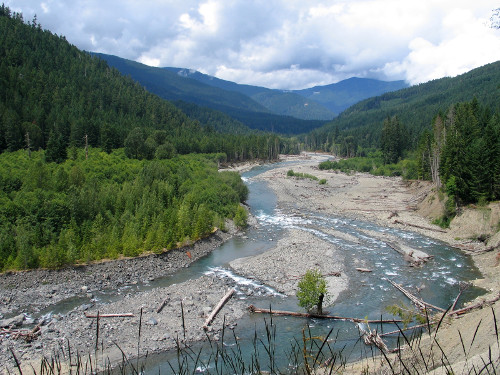SUBSCRIBE TO THE FREE NEWSLETTER
Get Outside! Warrior Rock Lighthouse
Today at Cascadia Magazine, hiking expert Craig Romano shares an easy day hike that’s a short drive from Portland: Warrior Rock lighthouse on Sauvie Island. You’ll walk through groves of cottonwoods and along the sandy shores of the Columbia where you can spot tugs plying the river, migrating birds in fall and winter, and views to Mount St. Helens on the far shore.
Hiking expert Craig Romano’s bi-weekly column Get Outside! offers hiking suggestions from all over Cascadia–including directions, route details, and historical notes. Even if the weather forecast is grim, put on some rain gear and get outside…
You can read the entire article here.
Alberta’s pipeline bid highlights bungling of oil revenues
In an opinion piece for the Tyee, Mitchell Anderson criticizes Alberta’s battle for the TransMountain pipeline across British Columbia as a losing fight to restore a declining industry. Tar sands royalties amount to only 3 percent of Alberta’s budget, he notes, and and the industry employs only about 5,000 workers. He’s critical of Canadian prime minister Trudeau and Alberta premier Rachel Notley for backing a losing industry, considering most of the world is moving forward on limits on carbon.
WA considers bill to address violence among Indigenous women
The Stranger reports on a bill in the WA state legislature to encourage more cooperation between the state patrol and tribal law enforcement to combat the problem of violence against Indigenous women, who experience violent attacks at a rate 1.7 times that of white women. Meanwhile, in Oregon, governor Kate Brown is supporting a bill that would eliminate the “boyfriend loophole” in a law that prevents those convicted of domestic violence from possessing firearms–the law currently only applies to legal spouses. And the Washington legislature overwhelmingly passed a law removing the statute of limitations for rape.
High speed rail between Vancouver & Seattle could have big payoff
According to the Vancouver Sun, a new study concludes that an ultra-high speed mag-lev train between Portland, Seattle, and Vancouver, BC,–though it would have a hefty price tag of $40 billion–could eventually contribute as much as $700 billion to Cascadia’s economy. The rail line, which could potentially be completed by 2035, would reduce travel time between Vancouver and Seattle to one hour.
A tribal perspective on restoring the Elwha River
In an article and excellent video for Nautilus, wildlife biologist Cameron Macias, who’s a member of the Lower Elwha Klallam Tribe, talks about the restoration of the Elwha River on Washington’s Olympic peninsula after the removal of the Glines Canyon dam in 2011. Not only salmon are returning–which are culturally significant to the Klallam–but an entire ecosystem is recovering, she notes.
A Spokane poet launches her book with a “feral opera”
The Inlander reports on how Spokane-based poet Ellen Welcker, who has a new collection, The Pink Tablet, decided rather than a poetry reading, she would stage a collaborative “feral opera” featuring dance, spoken word, music, and visual effects. The performances takes place tonight (Friday Feb 9) and Saturday, Feb. 10. You can support Welcker’s GoFundMe page for Pink Tablet here.
A poem by Oregon’s Rachel Cedar at Pacifica
Oregon-based poet Rachel Cedar has a poem online at Pacifica Literary Review entitled “The Papers Read: Today She Was Stolen,” an elegy of sorts for orca whales and innocence:
“…You could hear the mothers screaming,
my customers say, remembering
the day Tokitae was stolen….”
Read the full poem here.
That’s today’s news, arts, and culture from across Cascadia. Have a great weekend! –Andrew Engelson
Photo credit: Elwha River by “Elwhajeff” on Wikimedia Commons CC BY-SA 3.0

